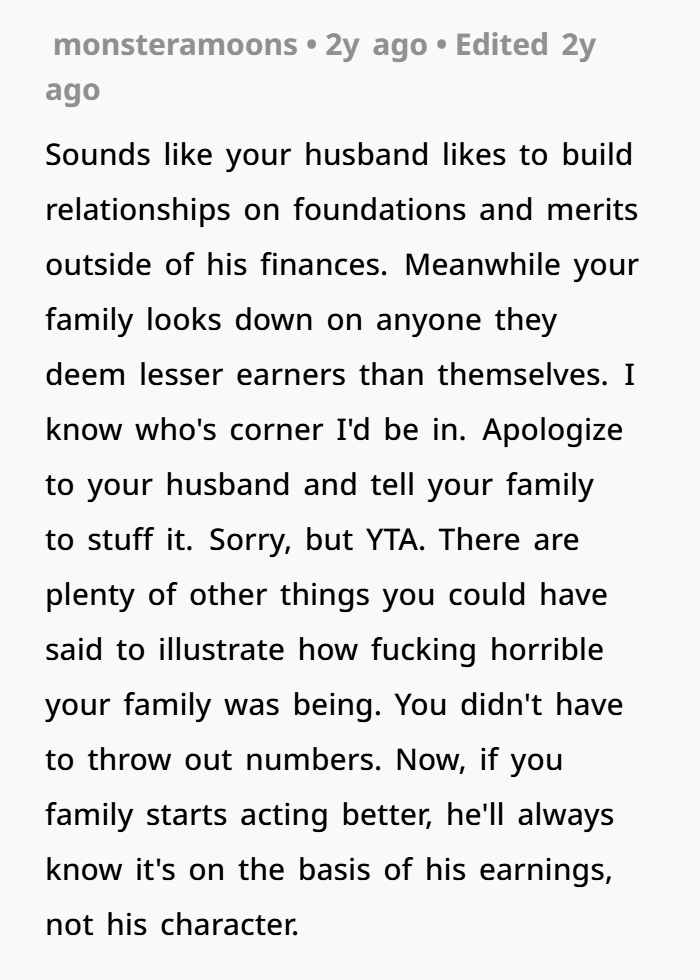Tool Boy Makes More Than a Surgeon—Guess What Happened When I Told My Family
OP comes from a family stacked with professionals—doctors, dentists, and high-earning career types. They’re proud of their titles and income, and it’s clear from the get-go that they didn’t take her fiancé seriously. Why? Because he works in construction.
But here’s the twist: he’s not just some guy swinging a hammer. He owns the business. In fact, he owns multiple construction sites and rental properties, and his total income surpasses that of her father, who’s a surgeon. Double, actually. The kicker? He asked OP to keep all that private, not because he’s ashamed—but because he doesn’t need to prove anything.
Still, years of her family calling him “tool boy” and making degrading remarks finally pushed OP over the edge. When they suggested a prenup to “protect her assets,” she snapped—and told them just how much money he really makes. Her family was stunned. Her fiancé? Not thrilled.
Now she’s caught between two
angry camps—her family feels betrayed, and her fiancé feels exposed.
Even though financial stability is important, happiness in healthy relationships revolves around more than just money

One internet user shared how her family kept looking down on her fiancé, unaware of how much he actually brought to the table


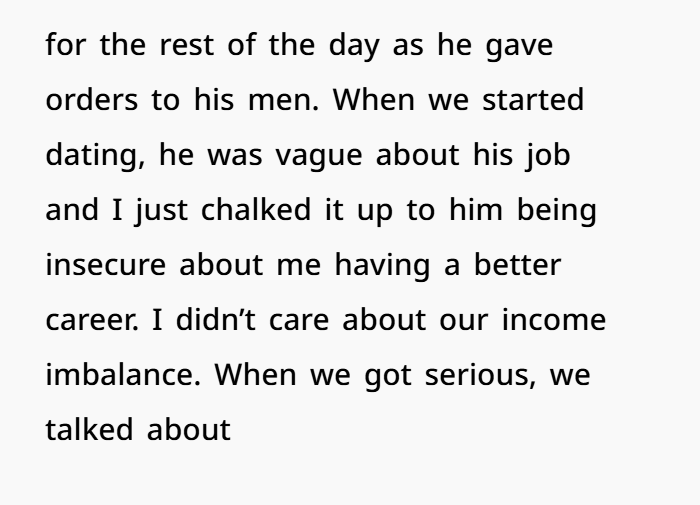
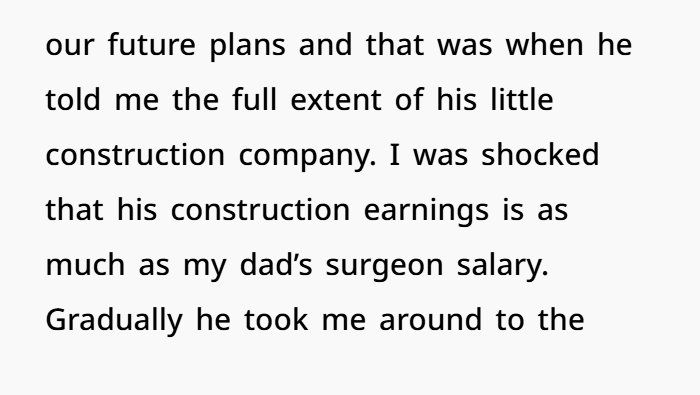
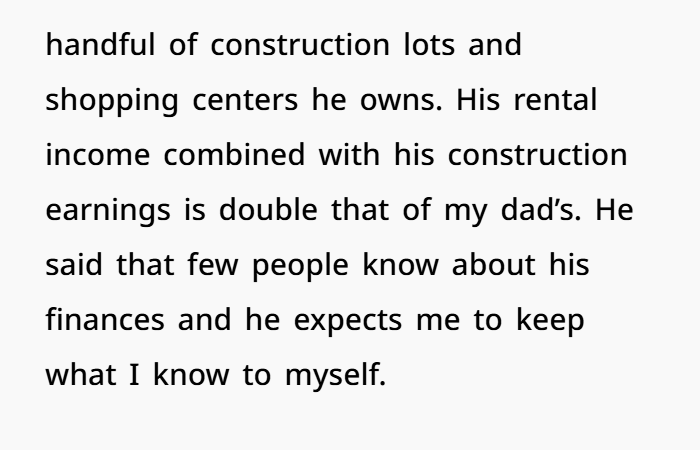

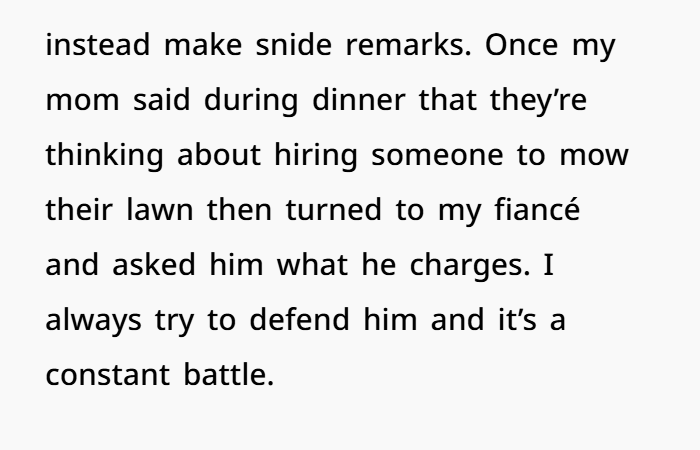
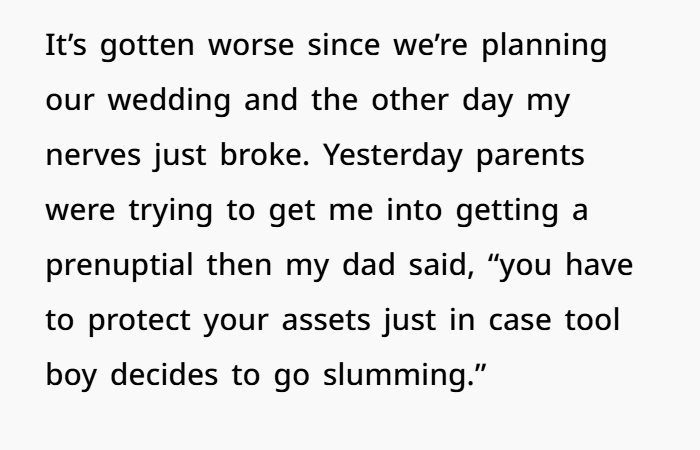



This story isn’t just about family drama—it’s about class perception, income stereotypes, emotional labor, and boundaries. It’s also a real look at how people equate prestige with intelligence and wealth, and how quick they are to dismiss those who don’t fit their mold.
Let’s dive into why this story has everyone picking sides—and what it really says about relationships, financial privacy, and the painful assumptions people still make about “blue-collar work.”
👷♂️ Blue Collar ≠ Broke
It’s wild how many people still think that blue-collar jobs mean low pay and low intelligence. That couldn’t be further from the truth. Skilled tradespeople—from electricians and welders to general contractors and plumbers—often earn six-figure salaries, especially when they run their own businesses.
Construction business owners like OP’s fiancé can make $200K, $300K, or even $500K+ annually depending on how many projects they juggle, how much property they own, and how much rental income flows in. That’s not even counting long-term investments, appreciation on commercial properties, or tax advantages tied to real estate income.
In fact, in many parts of the U.S., the average construction company owner salary can rival or exceed that of mid-tier medical professionals. According to the U.S. Bureau of Labor Statistics, the top 10% of construction managers earn over $170,000—and that’s just salary, not profits from ownership.

Now add real estate income, property flipping, and passive rental returns, and you’ve got someone who’s not just doing well—they’re building generational wealth.
📉 Prestige vs. Practical Wealth
One big issue here? The prestige trap.
OP’s family is full of professionals who tie worth to job titles. They respect “surgeon,” “dentist,” and “engineer,” but scoff at “contractor” or “roofer,” even though those roles can be just as (or more) lucrative. This kind of career elitism isn’t uncommon. People confuse respectability with value, thinking only those with degrees are worthy of admiration.
But here’s the thing: financial freedom doesn’t care what your title is.
A guy in steel-toe boots can have a higher net worth than a guy in a white coat—and that seems to be what really shook OP’s family. It wasn’t that he was underqualified. It was that he didn’t fit the mold they expected for someone “good enough” for their daughter.
🤐 Trust and Financial Privacy in Relationships
Now, let’s talk about OP’s fiancé.
He asked for financial privacy, which is huge. Especially for self-made people, wealth can be a sensitive topic. He wasn’t hiding his money—he just didn’t want to be defined by it. That’s fair. It’s also likely that he’s dealt with being judged both ways in the past—dismissed as “just a contractor” or used by people once they realize he’s loaded.
So when OP told her family about his income—even though she meant well—it felt like a betrayal to him. For someone who’s protective of his success, having that revealed in a moment of anger probably felt like losing control over something he’d worked hard to manage quietly.
And he’s right to be upset. But at the same time…
😤 Emotional Burnout and the Cost of Defending Your Partner
OP had every right to defend her fiancé. She’s been battling her family’s snide comments for years. Every dinner turns into a roast session. Her parents ask him what he charges to mow lawns. They call him tool boy behind his back. That’s beyond disrespectful—it’s dehumanizing.

So when they asked her to get a prenup—as if she’s the financially dominant one—she snapped. And honestly? Who wouldn’t?
This wasn’t just about money. It was about years of being talked down to, disrespected, and pushed into defending someone she loves against elitist snobbery. Sometimes, you break. Sometimes, you shout. And sometimes, yeah, you drop the bomb.
It may not have been the best moment—but it was a human one.
🫂 So… Is She the A**hole?
Honestly? No.
She may have broken a promise, but it wasn’t out of spite. It was a moment of defense, not betrayal. If anything, she stood up for her fiancé when no one else would.
That said—she now has work to do. She needs to rebuild trust with her fiancé and explain why that moment mattered. But he also needs to understand the emotional toll it takes when your own family treats your partner like trash.
As for the family? Maybe now they’ll finally put some respect on the “tool boy” who probably earns more in passive income than they do in surgery hours.
The author of the post revealed some more background info in the comments
